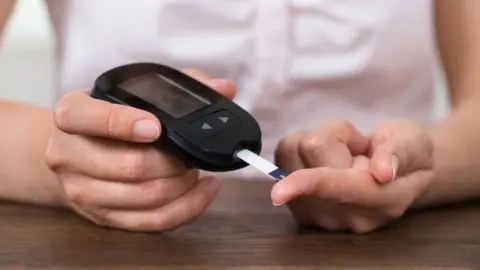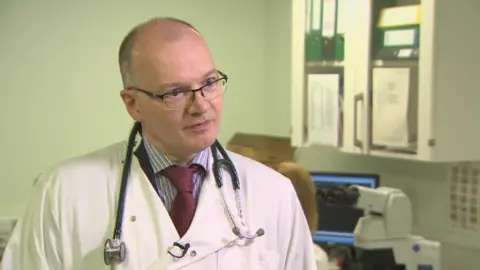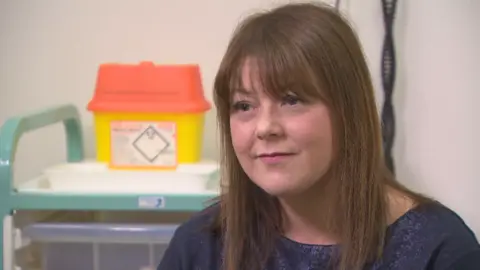Diabetes blood test 'could mean end to daily insulin jabs'
 Getty Images
Getty ImagesDoctors in Edinburgh believe a simple blood test they have introduced could allow some Type 1 diabetes patients to come off insulin.
The Western General hospital team say the test has identified previously unrecognised variants of the condition.
A routine screening programme was set up after medics discovered one patient had a genetic form of diabetes.
They say it has "transformational" results which, for some people, could mean the end of daily injections.
Traditionally, it had been believed that people with Type 1 diabetes do not produce any insulin.
That means they need lifelong monitoring and daily insulin treatments.
More recently, research has suggested there may be more sub-variations of the condition.
Since introducing the C-peptide blood test last summer, several patients have been able to completely come off insulin, while for others it has meant doctors can tailor treatments.

Prof Mark Strachan, who is a consultant in diabetes and endocrinology at the Western General Hospital, has now called for every patient to undergo screening - which costs £6 a time.
He said: "If we identify that somebody has a genetic type of diabetes, it can have a transformative effect on their life.
"Also, if we can establish that an individual has another form of diabetes, such as Type 2 diabetes, again there may be alternative treatments to insulin that we can offer them.
"So I think it is a very important and potentially transformative test."

'It was just elation, and disbelief'

Sophie Fleming is a regular visitor to the Western General. She was diagnosed with Type 1 diabetes at the age of eight. It meant insulin injections every day, and multiple blood pricks to monitor glucose levels.
She said: "It was very restrictive and as a small child, there were birthday parties and birthday cakes. And as soon as you tell someone they can't have something, they desperately want it.
"On being diagnosed, my mum said I cried every single night for six weeks, 'why me?'"
Throughout her teens, despite using an insulin pump, her diabetes was hard to manage.
Blood sugar levels
But when she was pregnant with her first child, doctors decided to carry out a blood test - and to their amazement they found she had a rare genetic form of the disease.
It meant doctors were able to stop Sophie's insulin treatment and manage her diabetes with tablets. Her blood sugar levels are now the best they have been in the entirety of her life with diabetes.
Sophie said: "It was just elation, and disbelief. I didn't quite believe that this would turn out the way they were expecting it to.
"I actually didn't take my pump off for a couple of days after cutting down on insulin - and even then I kept it beside my bed for a good six weeks, programmed ready to plug back in and ready to go again.
"Because after 27 years, I just didn't think I'd be on anything but insulin."
